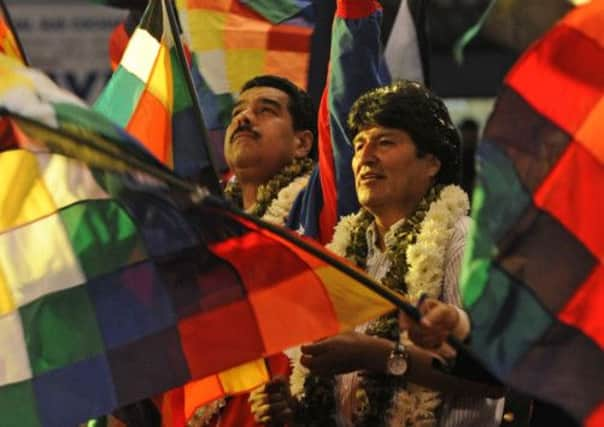Bolivia threat to shut US embassy over airplane snub


As the row continued yesterday, South America’s leftist leaders rallied in support of Mr Morales, demanding an apology from France, Italy, Portugal and Spain after the incident earlier this week.
At a summit, the presidents of Argentina, Ecuador, Suriname, Venezuela and Uruguay joined Mr Morales in the Bolivian city of Cochabamba, denouncing his treatment.
Advertisement
Hide AdAdvertisement
Hide AdMr Morales again blamed Washington for pressuring European countries to refuse to allow his plane to fly through their airspace on Tuesday, forcing it to land in Austria, in what he called a violation of international law.
He had been returning from a summit in Russia during which he had suggested he would be willing to consider a request from Mr Snowden for asylum.
Yesterday, Spain’s foreign minister insisted that no apology was needed, insisting that Spanish airspace was never closed to Mr Morales.
Jose Manuel Garcia-Margallo said that his nation and other European countries were told Mr Snowden was on board the Bolivian presidential plane. He did not say who supplied the information and declined to say whether he had been in contact with the United States.
Mr Garcia-Margallo said Bolivian foreign minister David Choquehuanca gave him written assurances that Snowden was not on the plane.
He said: “Spain does not have to make any apology. The airspace was never closed.”
Latin American leaders were outraged by the incident, calling it a violation of national sovereignty and a slap in the face for a region.
“United we will defeat American imperialism. We met with the leaders of my party and they asked us for several measures and if necessary, we will close the embassy of the United States,” Mr Morales said in the city where he started his political career as a leader of coca leaf farmers.
Advertisement
Hide AdAdvertisement
Hide AdHe added: “We do not need the embassy of the United States.”
Mr Morales’ government has had a tense relationship with Washington. It expelled the US ambassador and agents of the US Drug Enforcement Administration in 2008 for allegedly inciting the opposition.
The Andean nation restored full diplomatic ties with the US in 2011. But relations soured again amid mutual distrust on drug war politics and hit an especially low point after US secretary of state John Kerry referred to the Western hemisphere as Washington’s “backyard” in April.
Mr Morales expelled the US Agency for International Development in May for allegedly seeking to undermine his government.
In a joint statement after the summit, the presidents said they would back Bolivia’s official complaint with the UN Human Rights Commission.
Ecuadorean president Rafael Correa said that he and other leaders were offering full support to Mr Morales following the plane rerouting, calling it an aggression against the Americas.
“We’re not going to accept that in the 21st century there’s first, second and third rate countries,” Mr Correa said.
The US has declined to comment on whether it was involved in any decision to close European airspace, saying only that “US officials have been in touch with a broad range of countries over the course of the last ten days,” about the Snowden case.
Advertisement
Hide AdAdvertisement
Hide Ad“The message has been communicated both publicly and privately,” a state department spokeswoman said. “He should be returned to the United States.”
Mr Snowden remains out of public view, believed to be in a Moscow airport transit area.
SEE ALSO: